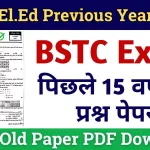Punjab University provides pu old question papers for LLB, BPED, and LLM courses. These papers help students understand the exam pattern and important topics.
Accessing and studying these papers can enhance preparation, offering a glimpse into the types of questions asked and aiding in better exam performance
LLB OId Question Papers for Punjab University
Question: Define the term ‘jurisprudence’ and explain its importance.
Answer: Jurisprudence is the theoretical study of law, focusing on the nature, sources, and purposes of law. It is important as it helps in understanding the underlying principles of legal systems and guiding the application and development of laws.
Question: Explain the concept of ‘Rule of Law.’
Answer: The Rule of Law is the principle that all individuals and institutions are subject to and accountable to law that is fairly applied and enforced. It ensures equality before the law, protection of human rights, and prevention of arbitrary use of power.
Question: What is the doctrine of ‘Stare Decisis’?
Answer: Stare Decisis is a legal doctrine that obligates courts to follow historical cases when making a ruling on a similar case. It ensures consistency and predictability in the law.
Question: Discuss the significance of the Indian Constitution.
Answer: The Indian Constitution is the supreme law of India, outlining the framework of government, fundamental rights, duties, and guiding principles. It is significant as it establishes democratic governance and safeguards the rights and freedoms of citizens.
Question: What are the essential elements of a valid contract?
Answer: The essential elements of a valid contract include offer and acceptance, intention to create legal relations, lawful consideration, capacity to contract, free consent, and lawful object.
Question: Explain the concept of ‘natural justice.’
Answer: Natural justice refers to the basic principles of fair procedure, including the right to a fair hearing and the rule against bias. It ensures fairness in administrative and judicial decisions.
Question: What is the difference between civil and criminal law?
Answer: Civil law deals with disputes between individuals or organizations, typically involving private rights and remedies. Criminal law involves offenses against the state, with penalties including fines and imprisonment.
Question: Define ‘mens rea’ and its relevance in criminal law.
Answer: Mens rea, or ‘guilty mind,’ refers to the mental state of intent or knowledge of wrongdoing. It is a crucial element in determining criminal liability, differentiating between intentional and accidental actions.
Question: What are the fundamental rights guaranteed by the Indian Constitution?
Answer: The Indian Constitution guarantees fundamental rights such as the right to equality, freedom, protection against exploitation, freedom of religion, cultural and educational rights, and the right to constitutional remedies.
Question: Discuss the concept of ‘judicial review.’
Answer: Judicial review is the power of courts to examine the constitutionality of legislative acts and executive decisions. It ensures that laws and actions of the government comply with the Constitution.
[save_as_pdf_pdfcrowd]
BPED OId Question Papers for Punjab University
Question: Define physical education and its objectives.
Answer: Physical education is a field of study that focuses on developing physical fitness, motor skills, and healthy lifestyle habits. Its objectives include promoting physical health, mental well-being, social skills, and overall development.
Question: Explain the principles of training in physical education.
Answer: The principles of training include specificity, overload, progression, reversibility, and individuality. These principles guide the design and implementation of effective training programs.
Question: What are the benefits of regular physical activity?
Answer: Regular physical activity improves cardiovascular health, strengthens muscles and bones, enhances mental health, reduces the risk of chronic diseases, and promotes overall well-being.
Question: Discuss the role of physical education in promoting lifelong fitness.
Answer: Physical education instills knowledge, skills, and attitudes necessary for maintaining an active lifestyle. It encourages healthy habits, regular exercise, and a positive attitude towards physical activity.
Question: Describe the different types of fitness assessments used in physical education.
Answer: Fitness assessments include cardiovascular endurance tests (e.g., beep test), muscular strength tests (e.g., push-ups), flexibility tests (e.g., sit-and-reach), and body composition assessments (e.g., BMI).
Question: Explain the concept of sports psychology and its importance.
Answer: Sports psychology studies the mental and emotional aspects of physical activity and sports. It helps athletes improve performance, manage stress, enhance motivation, and develop coping strategies.
Question: What are the key components of a balanced diet for athletes?
Answer: A balanced diet for athletes includes carbohydrates for energy, proteins for muscle repair and growth, fats for energy storage, vitamins and minerals for overall health, and adequate hydration.
Question: Discuss the impact of physical education on mental health.
Answer: Physical education improves mental health by reducing stress, anxiety, and depression. It enhances mood, self-esteem, cognitive function, and provides opportunities for social interaction and support.
Question: What are the ethical considerations in sports and physical education?
Answer: Ethical considerations include fairness, respect, integrity, and responsibility. Issues like doping, cheating, and abuse should be addressed to promote a positive and inclusive environment.
Question: Explain the role of technology in enhancing physical education.
Answer: Technology enhances physical education through fitness tracking devices, virtual training programs, online resources, and interactive tools that support learning, assessment, and motivation.
[save_as_pdf_pdfcrowd]
LLM OId Question Papers for Punjab University
Question: Discuss the concept of international human rights law.
Answer: International human rights law comprises treaties, conventions, and customary international law that protect the fundamental rights and freedoms of individuals globally. It aims to ensure dignity, equality, and justice.
Question: Explain the doctrine of ‘sovereign immunity’ in international law.
Answer: Sovereign immunity is a legal doctrine that exempts states and their officials from the jurisdiction of foreign courts. It protects state sovereignty and diplomatic relations.
Question: What is the significance of the Vienna Convention on Diplomatic Relations?
Answer: The Vienna Convention on Diplomatic Relations establishes the framework for diplomatic relations between states, outlining the privileges, immunities, and duties of diplomatic missions to ensure effective international communication.
Question: Define ‘corporate governance’ and its importance in company law.
Answer: Corporate governance refers to the system of rules, practices, and processes by which a company is directed and controlled. It ensures accountability, transparency, and ethical conduct, protecting the interests of stakeholders.
Question: Discuss the principles of environmental law.
Answer: Environmental law principles include sustainable development, precautionary principle, polluter pays principle, and intergenerational equity. These principles guide the protection and management of the environment.
Question: Explain the concept of ‘judicial activism’ and its impact on legal systems.
Answer: Judicial activism refers to the proactive role of courts in interpreting laws and the Constitution to address social issues and protect rights. It can lead to significant legal and societal changes.
Question: What are the key elements of the General Data Protection Regulation (GDPR)?
Answer: GDPR key elements include data protection principles, data subject rights, obligations of data controllers and processors, breach notification requirements, and penalties for non-compliance. It aims to protect personal data and privacy.
Question: Describe the role of the International Criminal Court (ICC).
Answer: The ICC is a permanent international tribunal that prosecutes individuals for genocide, war crimes, crimes against humanity, and aggression. It aims to ensure justice and accountability for serious international crimes.
Question: What is the difference between ‘arbitration’ and ‘mediation’ in alternative dispute resolution?
Answer: Arbitration involves a neutral third party making a binding decision after hearing both sides, while mediation involves a mediator facilitating negotiation between parties to reach a mutually agreeable solution.
Question: Discuss the legal implications of climate change agreements.
Answer: Climate change agreements, like the Paris Agreement, have legal implications for participating countries, requiring them to reduce greenhouse gas emissions, implement climate policies, and report progress. Non-compliance can lead to international scrutiny and potential sanctions.
[save_as_pdf_pdfcrowd]
Punjab University Exam Pattern for LLB, BPED, and LLM (Old)
LLB (Bachelor of Laws)
Exam Structure:
- Duration: 3 years (divided into 6 semesters)
- Subjects Covered: Constitutional Law, Contract Law, Criminal Law, Family Law, Property Law, and other legal subjects.
- Assessment: Combination of internal assessment (assignments, presentations, class tests) and end-semester examinations.
End-Semester Exam Pattern:
- Type of Questions:
- Objective Type (Multiple Choice Questions)
- Subjective Type (Short Answer Questions, Long Answer Questions, Essays)
- Total Marks: Generally, each paper is of 100 marks.
- Duration: 3 hours per paper.
- Passing Criteria: Minimum 40% in each paper and aggregate 45% in all subjects combined.
BPED (Bachelor of Physical Education)
Exam Structure:
- Duration: 2 years (divided into 4 semesters)
- Subjects Covered: Anatomy, Physiology, Health Education, Sports Psychology, Physical Fitness, and various sports disciplines.
- Assessment: Combination of practical exams, internal assessment (projects, class tests, assignments), and end-semester theory examinations.
End-Semester Exam Pattern:
- Type of Questions:
- Theory Papers (Objective and Subjective Questions)
- Practical Exams (Skill Tests, Viva Voce, Demonstration)
- Total Marks: Each theory paper is usually 100 marks, practical exams may vary.
- Duration: 3 hours for theory papers.
- Passing Criteria: Minimum 40% in each paper and aggregate 45% in all subjects combined.
LLM (Master of Laws) – Old Scheme
Exam Structure:
- Duration: 2 years (divided into 4 semesters)
- Subjects Covered: Advanced study in Constitutional Law, International Law, Corporate Law, Human Rights Law, Environmental Law, etc.
- Assessment: Combination of internal assessment (seminars, assignments, presentations) and end-semester examinations.
End-Semester Exam Pattern:
- Type of Questions:
- Objective Type (Multiple Choice Questions)
- Subjective Type (Short Answer Questions, Long Answer Questions, Essays)
- Total Marks: Each paper generally carries 100 marks.
- Duration: 3 hours per paper.
- Passing Criteria: Minimum 50% in each paper and aggregate 50% in all subjects combined.
General Guidelines:
- Attendance: A minimum of 75% attendance is required to be eligible for the examinations.
- Internal Assessments: Regular submissions and participation in class activities are crucial as they significantly contribute to the final grades.
- Re-evaluation: Students may apply for re-evaluation of their answer scripts if they are not satisfied with the results, subject to the university’s rules and deadlines.
Latest Posts
- Step-by-step guide to download and apply for jee mains admit card 202
- Comprehensive 2025 government holidays and recruitment details for job seekers
- JEE Mains Admit Card 2025: Your Step-by-Step Guide to Downloading the Hall Ticket
- Everything You Need to Know About 2025 Government Holidays Recruitment
- Comprehensive Guide to rrb d group recruitment 2025 – Eligibility, Vacancies, and Application
- Detailed guide to nps trust recruitment 2025 vacancies, eligibility and apply process
- Comprehensive guide to hpcl recruitment 2025 notification, vacancies, and application process
- ignou bed admission 2025 complete recruitment guide with eligibility and process
- Comprehensive Guide to Indian Army Agniveer Recruitment 2025 Notification and Jobs
- Everything You Must Know About CBSE Board Exams 2025 Changes & New Rules






